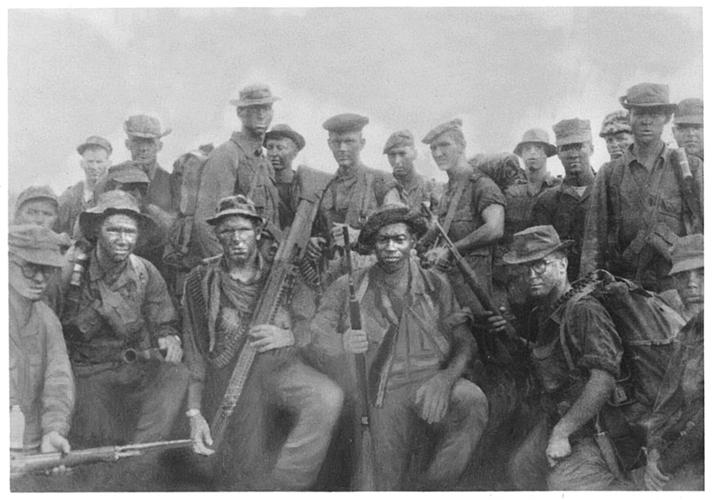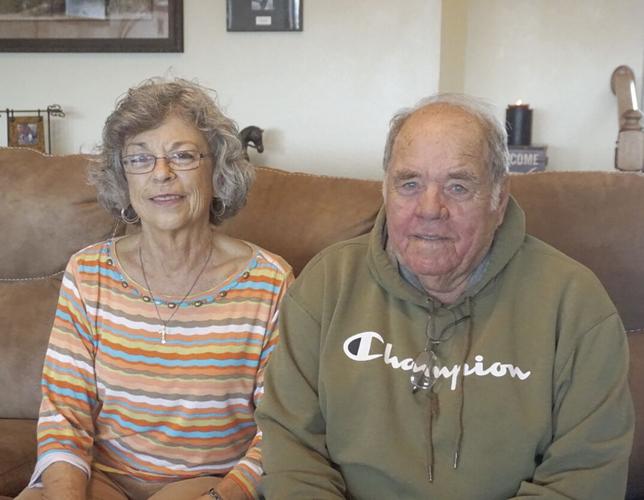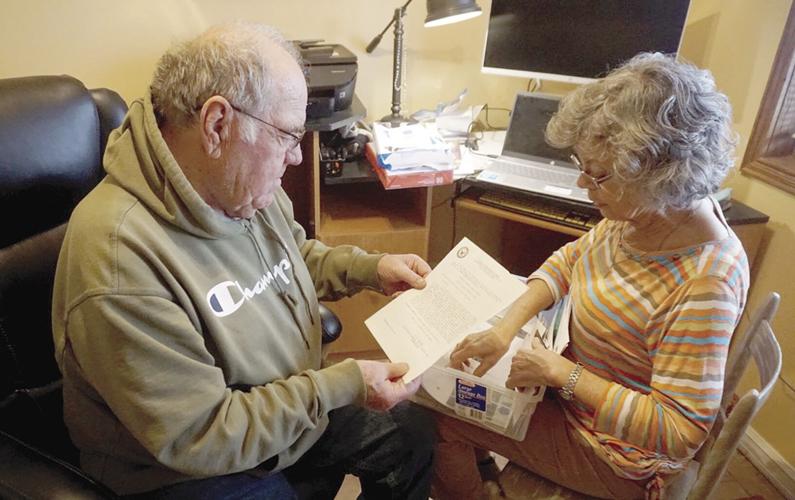If you ever get the opportunity to talk to Bob Gannon, you’ll notice the tenacity in his character, the wisdom in his attitude, his unwavering work ethic, and his tremendous compassion. Short of him sharing what he’s been through, you could hardly guess that Gannon is a man who has been to hell and back. That’s because he has found peace and purpose in his suffering as he shares his life’s philosophy in his autobiography Never Give Up (published in 2020). His work outlines his difficult childhood growing up with an abusive father in rural Missouri, his harrowing experiences in the military, and his life since which has had its own highs and lows.
Gannon is a Reconnaissance Marine who served on more than 30 missions behind enemy lines during the Vietnam War—most of them as a platoon leader. Gannon carries emotional scars that he has struggled to overcome over the last 50 years as he has battled against post-traumatic stress disorder. To loved ones, like his children, Gannon has often been cold and distant over the years as he tried to drown his pain with alcohol and adultery. Despite his struggles Gannon has achieved a successful life.
Gannon wrote the book for the same reason that he has volunteered in Celebrate Recovery Men’s and Women’s Chemical Dependency and Men’s and Women’s Codependency for more than 20 years. It’s the same reason that he has been involved in prison ministry over the years, and why he started speaking at events and churches and to almost anyone who invited him to share his story. His reason is this: he wants to share the hope that he has and show that no matter what awful things have happened to people that there is a path to peace.
His childhood started inauspiciously when he was born in 1942 the second of five children in St. Louis—his family later relocated to Argyle, a small farming community west of Freeburg in Maries and Osage counties.
Gannon described the house he grew up in as “an old, rundown, two story farmhouse with no electricity, running water, or indoor plumbing,” Gannon wrote. The family had to content themselves with infrequent bathing and using an outhouse located more than 100 yards from the house, a distance that made for an arduous journey on cold winter nights. “The entire house was heated by one wood stove located on the main floor,” he wrote. “During the midwinter months, if you took a glass of water upstairs, the water would be frozen by morning.”
“There were no jobs in Argyle. It was a self-contained town and a farming community,” wrote Gannon.
“Some of my life as a child was really good, and some of it was really bad. The good was the town, the people and my friends.” Gannon wrote fondly about hunting and fishing and playing baseball.
The worst thing about Gannon’s childhood was not the fact that when he was in the fifth grade he was responsible for plowing the two-and-a-half-acre corn field with mules, or tending the acre-sized garden that sustained them, or milking cows, or chopping wood for their stove, or wearing the dunce cap due to his now-understood challenges with dyslexia.
At a parent/teacher meeting when Gannon was in the second grade, the teacher delivered the bad news to his mother about the fact that he had trouble reading and writing.
“Right in front of me the teacher told my mom that I was very dumb and I probably wouldn’t amount to much more than a ditch digger,” wrote Gannon.
Those words really hurt the young Gannon’s developing self-worth. He began thinking to himself at that young age, “Why has God done this to me?”
On top of being dyslexic, Gannon is left-handed. They tried to force him to write with his right hand, but he couldn’t.
“This was very humiliating and degrading for a young child as it takes away all of their self-worth and develops in them an attitude of worthlessness,” he wrote.
Gannon quit trying to learn in the second grade. Why learn? Gannon already believed that he’d never have a good job or amount to anything.
The truly worst thing about Gannon’s childhood was, in fact, growing up with an abusive and alcoholic father. “He was not only mentally abusive, but physically abusive,” wrote Gannon. “We always lived in fear because we never knew when he was going to come home drunk and abusive. It was walking on eggshells all the time.”
According to Gannon, once you give up in life, you become angry—Gannon became an angry child.
“That was pretty much how my whole childhood went,” wrote Gannon. Gannon had his own chores on the farm and he also did a variety of hard labor in his youth.
“I also worked on farms hauling hay, clearing off land with an ax, worked at a turkey farm, worked at a feed-store, and I dug graves. As I got older, I worked at charcoal kilns loading cord wood into the kilns, which was very heavy work for a young man,” wrote Gannon. Additionally, Gannon had to walk eight miles to and from the kiln every day and he gave all of his wages to his parents. Gannon was going to quit high school at 16 and work full-time at the kiln, but it was illegal for a minor to do that sort of work and somebody turned him in.
Gannon hated the idea of working in a factory. So, when he was old enough to leave town, he decided to join the military.
Despite the hardships that his family faced and the abusiveness of his father, Gannon said that he’s still glad that he grew up in Argyle, but he’s also glad that he left and never moved back.
He was going to join the Navy but, as fate would have it, the recruiter was out when Gannon arrived and he signed with the Marine Corps instead.
Gannon was inducted and sworn in to the Marine Corps May 15, 1960. A date more important to him than his birth, which isn’t included until the end of the book.
From there it was off to bootcamp in San Diego (California).
In Gannon’s book, he describes how difficult the program was and how many people dropped out of the program for this reason or that. “The struggle was all worth it just to be called a Marine. It was really a great accomplishment, especially since my father told me I would never be tough enough to make it.”
Gannon finally belonged somewhere and his talents were appreciated—it was the Marine Corps.
After graduating boot camp, he was sent to Camp Pendleton (California) for 30 days of infantry training. He had hoped that the Marine Corps was going to also send him to school to get some training. “Instead, I wound up in the Fourth Marines in the infantry, stationed in Hawaii, and I received no schooling.”
Gannon was assigned to the Delta Company. As the new guy, he was delegated to carrying the Browning automatic rifle (BAR), which added an extra 33 pounds to his load on top of the cumbersome pack he carried on his back.
As it turned out, Gannon ended up having substantial prowess as a marksman.
“I was so good with the BAR that with only a few shots, I could not only hit the targets but also split the stakes holding up the targets! This was from a standing position shooting from the hip,” Gannon wrote. Gannon was then promoted to fire team leader.
At the Marine Corps Institute, Gannon took courses on a variety of topics, including military tactics and strategies.
“I just kept taking the courses and passing them,” he wrote.
Gannon turned out to be a model Marine. First he was promoted to private first class and then within a few months he was a lance corporal. He even joined the Marine swim team and won the interservice championship. Gannon shares stories in his book about snakes and monkeys while he was stationed in the Philippines. While in the islands he met and married his first wife, a Filipino woman named Catilina and his first child, Joe, was born while he was stationed there.
After the Philippines, it was back to Camp Pendleton where he received his orders to join Charlie Company First Reconnaissance Battalion.
“I’ll never forget my first day after joining Charlie Company, First Recon. I thought I was in pretty good shape. I had just come from the Philippines where I swam the 400-meter on the Marine team and ran eight miles every other day,” he wrote.
The first day of training was so rigorous that Gannon, as tough as he is, was pushed past his current limits.
“Thank God it was Friday because Saturday morning I couldn’t get out of bed,” wrote Gannon.
When it came time for them to ship out to Vietnam, they called Gannon to the office and told him that on account of him being the only boy in his family, he wouldn’t be required to go and if he wanted to go, he would have to sign a waiver. Gannon was relieved at the news, but he didn’t want someone else to go in his place. He signed the waiver.
“I am glad I did it. It would be hard, even still today, living with the thought that maybe I was a coward,” he wrote.
“When we got to Vietnam and began operating behind enemy lines, we developed what they now call hypersensitivity. It is caused by our minds staying on high alert,” wrote Gannon. They would sleep and be fully aware of their surroundings. Any scent or a tiny snap of a branch could wake them. “If a bird was singing and suddenly stopped, my mind would snap to attention.”
A soldier might be sound asleep, feeling a need to cough, without waking up, they would roll their shirt up and stick it in their mouth to muffle the cough. They rarely spoke and communicated primarily with hand gestures.
“All of our senses stayed constantly on high alert mode to survive. We never knew when the Viet Cong might show up,” he wrote.
“The first day of war was a battle called Operation Starlight, and it was a landing in Chu Lai, Vietnam,” Gannon wrote.
Gannon wasn’t going in on the first wave, but three tank operators he knew personally were. Gannon recollects saying something that he regrets to this day.
“Hey guys, I’ll bring a can opener with me in case that tank gets hit and you need somebody to cut you out,” Gannon told them and they all laughed and thought it was funny.
When Gannon saw them again later, the laughter was gone. “I just remember looking at them, and they were pale and whitish looking,” Gannon wrote. “They were the bodies of my friends, the tanker guys.” An hour earlier he’d been laughing with them.
“Before the battlefield, we didn’t realize the seriousness of war,” wrote Gannon.
Gannon was forever changed.
“My mind started building barriers and preventing me from getting too close or personally invested in others. Sadly, when we returned, my mind was still in the same mode. All of us began building an emotional wall to dull our feelings for others and even our own family,” wrote Gannon. For him, that wall continued to grow through his two tours in Vietnam and has taken him decades to overcome that isolating instinct.
After seeing his dead friends, they loaded onto a helicopter and landed in the middle of a battlefield where more than 600 Viet Cong soldiers lay dead already. They then passed through a village that had been caught in the firefight.
“No amount of training could ever prepare you for the horror of what happened to that village,” he wrote. The images of horror would be forever imprinted on their minds. If God was real, how could he let this happen?
Later, they came to another village where all of the women were on their knees, begging for their lives. “The Viet Cong had told them the Marines were called devil dogs and we would come into the village, rape them and kill them all,” wrote Gannon. Which in Gannon’s experience was never the case.
One woman tried to give them her baby, thinking that it might save its life.
“I knew what she was saying just as if she were speaking English,” wrote Gannon. It’s been more than 50 years since that day, and Gannon wrote that he can still visualize her face so clearly that if he were an artist, he could still paint her face.
Gannon’s heart ached with compassion as he imagined how terrifying that day must have been for them.
“A strange happening was when we turned to leave and had caused no harm, the women looked totally puzzled as we handed them some of our C-rations as we headed out of the village,” wrote Gannon.
As they swept onward through another village, they found a Marine who was weeping next to a cellar with his gun on the ground. When they looked inside “there was a dead Vietnamese woman and her baby, and her arms were still enveloping the baby. They had both been shot—the bullet had passed through the baby’s back and into the mother’s chest,” Gannon wrote.
The Viet Cong often used these sorts of hiding spots to ambush U.S. soldiers. The best Gannon could figure was that the Marine heard a sound from the cellar and fired out of instinct.
They couldn’t get the Marine to talk and he was so distraught that he couldn’t get up. They called in some medical help for the Marine and continued on.
“To this day I do not know what happened to him. I think about him a lot.”
From there they moved on to a field where the Viet Cong mortared them.
Gannon vividly remembers lying panicked on the ground.
This has been just a sample of what Gannon went through in the war and says almost nothing of the meticulous planning that he underwent before each and every of the 30 plus missions behind enemy lines. It also barely indicates how much respect he has for the men he served with.
Gannon experienced innumerable close encounters with death, he witnessed atrocities carried out by the Viet Cong and a village was shelled on his own command when the shells fell short of their target. He recounts watching fellow Marines die up close and from a distance.
There’s so much more to Gannon’s time in Vietnam, including missions he led, affectionately known as “Sergeant Rock” to his men who thought he was fearless.
Gannon also talks about the survivor’s guilt that he still feels about his platoon being ambushed while he was at the Naval Hospital in Memphis (Tennessee). They all died without his leadership.
“I was so angry that I swore that day I would go to hell before I would ever bow or kneel before a god who didn’t allow me to be with my men when they were ambushed,” Gannon wrote. A vow he ultimately broke during his healing process years later, but that didn’t stop the bitterness from that moment turning the angry boy that he was before the war into an even angrier man.
“For 50 years, even though I was not in the battle, I would still have daytime flashbacks as if I was there when they were being attacked. I could hear the gunfire; I could hear the screams of the men who were being shot,” wrote Gannon.
Those flashbacks often last for hours.
Eventually, after two tours of outstanding duty, Gannon was medically discharged from the Marines.
Gannon had served for nine years, four months and twenty-two days in the Marine Corps and was devastated about being discharged. “After growing up in a dysfunctional atmosphere, I had learned a lot in the Marine Corps.”
Gannon decided that despite his lack of education, he was going to go to college. He was determined to succeed. He decided that he wanted to take the electronics course at Linn Tech (now State Technical College of Missouri located in Linn).
When he took the entry exam, he placed at a sixth-grade level and flunked the electronics exam, but they decided to let him study there anyway. “I guess they saw something in me,” wrote Gannon.
His father, in typical fashion, told him that he was too dumb, but now his father’s verbal attack bounced off of his battle-hardened ego and physically his father couldn’t hold a candle to him.
“I became a platoon sergeant at 24 years of age. I survived 35 missions behind enemy lines. I led 25 missions as a platoon sergeant in my first tour. In my second tour, I was recognized for my knowledge and leadership skills, and no longer would I allow anybody to discourage my dream.”
Gannon spoke fondly of his time at Linn Tech, but not because it was easy. He had to put in a lot of extra hours to make up for the education he’d missed as a child. Not to mention that he had a family to support. When he got out of the Marine Corps, he had $600 to his name. That money went to purchasing a chainsaw and an old truck so that he could cut wood to sell to make a living. At first, they lived in an old mice infested farmhouse and later in a trailer.
Gannon only slept about three hours a night in those days, due to a combination of working hard and battling his post-traumatic stress.
“The first class was Algebra I. With a sixth-grade education, I didn’t even know about positive and negative numbers. What saved me was that I had the same group of people in all my classes and became acquainted with my classmates who were able to help me with my homework. Gannon took Algebra I, Algebra II, Trigonometry, Physics, Analytic Geometry and Calculus.
Gannon believes that he owes many of his accomplishments over the years, in part, to his dyslexia.
“I wasn’t so afraid of failing or not being good at something,” Gannon told The Salem News. Gannon always worked until he mastered a skill, no matter how difficult. A trait that was further honed during his time as a Marine.
Gannon graduated with an associate’s degree in electronics, but didn’t get a job right away and started his third year of school to study computer maintenance. “It involved a lot of programming (that’s when the microchip was first coming out) and the programming was machine language. That was a snap for me. It was the first time in my life I had the thrill at being the best in class, rather than praying to pass!” Gannon wrote.
Gannon went on to work with a pipeline company based out of Hartford (Illinois).
“The pipeline was a really great job, and I loved working alone. Probably at least 80% of the time we set our own schedules unless we were on a big job. We each had our own areas we were responsible for. My area required a lot of traveling and that is probably when my drinking problems began,” wrote Gannon.
“In the idle time, I would have flashbacks and depression. I would find myself on a lonely road somewhere crying and angry at God over my platoon that was ambushed and killed.”
Gannon wrote that he tried a lot of different methods to try and numb the pain.
“I went to bars, picked up women and became unfaithful. We are made in the image of Christ, it’s not possible to live a sinful life and have peace at the same time. So, there was turmoil. I sank so low that I didn’t want to look in the mirror,” Gannon wrote.
Gannon writes of a time he came to a stop sign while working in St. Louis when he broke down and started crying. “I finally hit bottom. It was one of the first times in my life I just totally broke down sobbing. Something tapped me on the shoulder, and a voice in my truck said, ‘It’s almost over’. The voice was very loud,” Gannon wrote. He said that he remembered questioning how God could ever love him after the life he had led and after he had cursed his name many times. Just like back when his platoon was ambushed without him.
Gannon said that the very next day was when everything started moving in the right direction for him. “I began to experience a gradual and daily spiritual growth.”
That’s what led him to later be involved in Celebrate Recovery and subsequently the CR prison ministry. Gannon has a passion for helping others through problems similar to his own struggles and Gannon also began to realize over the years that it was by helping others that he continued to heal.
“It was at this point I realized I began my own healing through the lessons, the testimonies, the small group meetings and the Celebrate Recovery step study,” wrote Gannon.
Gannon still volunteers with Celebrate Recovery and credits the step study with helping make it possible for him to face his demons.
Gannon also gives a lot of credit for his spiritual growth to his wife Judy who he met through cross-country bicycling.
“Judy endured some really difficult times with me, and she never complained. She knew what I was going through, and she would try to help me. She stuck with me. There were times I was so depressed that I didn’t want to talk or communicate at all. I would just go off by myself and spend a whole day in isolation,” wrote Gannon. He also stated that Judy knew how to let him heal in his own ways.
Gannon also said that his heart goes out to the families of people suffering from PTSD when they are unable to communicate a pain that they cannot understand or describe.
Judy later passed away in March of 2020.
“I’ll always be sorry that Judy is gone. We had a great life and lots of fun. I’m proud of the way she conducted herself and the way she served God,” he said.
It was her death that spurred Gannon forward to begin writing this book, despite his dyslexia and despite the pain that he reawakens each time that he reflects on his past. The book is dedicated to her memory.
Now Gannon, along with volunteering, speaking, and working on his next book, lives on his farm off of O Hwy. a few miles south of Rolla where he breeds horses and beef cattle.
His book can be found on amazon.com and other online book vendors. If interested in learning more about Gannon or inviting him to come speak he can reached at nevergiveup.pub.co@gmail.com or (573) 737-4107.


















